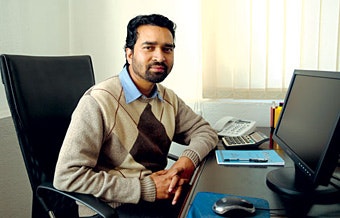A Tribute to Suvash Darnal
By Jonathan Hulland

Suvash Darnal, a prominent Nepali Dalit rights activist and scholar, was killed Monday morning in a car crash just outside Dulles Airport near Washington, D.C. Suvash founded and directed the Open Society supported Samata Foundation, a Kathmandu-based think-tank and policy institute dedicated to improving the lives of Nepal’s Dalits, the long discriminated “untouchable” caste thought to make up 20 percent of Nepal’s population.
Only 31 years old at the time of his death, Suvash overcame incredible odds (describing his own education as an “accident”) to become one of Nepal’s foremost Dalit personalities, excelling in all of his pursuits in journalism, political activism, and of late policy-oriented research and advocacy. Suvash was travelling in the U.S. as part of Stanford University’s prestigious Draper Hills Summer Fellowship Program on Democracy and Development.
To say that Suvash Darnal was a product of his times—a heady, turbulent, revolutionary era in Nepal’s recent history—would be something of an understatement because Suvash made his times, carving out a place for his own in a society that until recently had almost no place for an ambitious, bright, and determined Dalit. In 2006, Suvash played a prominent role in Nepal’s “people’s movement” which all at once seemed to bring down an authoritarian monarchy, end a bloody 10-year civil war, and usher in promises of democracy, peace and justice, offering nothing less than a “new Nepal.”
In the five years since that optimistic moment, when all things seemed possible, the revolution has stalled, and Nepal’s multiple transitions—from dictatorship to democracy, peace to war, monarchy to republic—are entangled and embittered. The mood in Kathmandu today, from where I’m writing this post, is grim. But Suvash never wavered from his determined optimism. With an ever-ready smile and boundless energy, Suvash was determined to forge that “new Nepal,” if only by sheer force of will and an infectious enthusiasm.
Having gotten to know Suvash over the past year and a half, his dedication to this mission was truly inspirational. Simply put, he would make Nepal a better place, for his wife Sarita, their two-year old daughter, and all Dalits facing a stubborn form of discrimination with perhaps no compare in the 21st century.
After an initial career in journalism, Suvash co-founded the Jagaran Media Center in 2000 to use the power of media to spread the Dalit cause and raise its profile. After great success with Jagaran, Suvash immersed himself in political activism, chairing the Collective Campaign for Peace, an important human rights and civil society umbrella organization during the “people’s movement.” And in 2008, Suvash was a Reagan-Fascell Democracy fellow at the National Endowment for Democracy in Washington, D.C.
In recent years, with the realization that Nepal’s Dalit movement needed more than activism and promises from politicians, Suvash immersed himself in the hard work of policy-making and research, founding the Samata Foundation in 2008. In just three years, Samata Foundation has become a vital force for the Dalit movement in Nepal and even beyond in South Asia at large. The Open Society Foundations are a proud supporter of Samata’s work. Suvash’s vision of a just and inclusive Nepal for all of its diverse peoples will not die with him. On the contrary, his short but fruitful life will surely serve as an example to all Nepalis working to build that bright, new Nepal that Suvash always knew was close and within reach.
A memorial Facebook page for Suvash Darnal can be found here.
Until April 2013, Jonathan Hulland was program coordinator for the Open Society Nepal and Bhutan Initiatives.